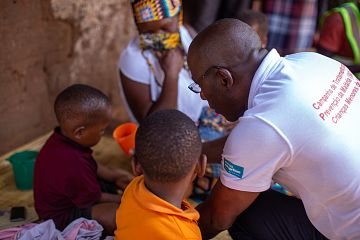Seasonal malaria chemoprevention intervention scaled up for the first time outside the Sahel
27 January 2023View Portuguese Version »
 Minister of Health of Mozambique, Armindo Tiago, administering the first dose of SPAQ, Anchilo community
Minister of Health of Mozambique, Armindo Tiago, administering the first dose of SPAQ, Anchilo communityMozambique has become the first country outside of the Sahel region to scale up its use of seasonal malaria chemoprevention (SMC). Beginning today, Malaria Consortium, in collaboration with Mozambique’s National Malaria Control Programme (NMCP), will target 1.3 million children under five in all 23 districts in Nampula province in northern Mozambique. This follows the conclusion of a successful study to assess the acceptability, feasibility and the protective effect of the intervention, which has historically been limited to use in the Sahel region.
Malaria is the leading cause of morbidity and mortality in Mozambique, responsible for 10 million infections and over 23,000 deaths in 2020, with children under five and pregnant women most at risk. SMC involves the monthly administration of antimalarial medicines to prevent disease in children under five during the peak transmission season, which in Nampula lasts from January to April.
Severin Ritter von Xylander, a representative from the World Health Organization (WHO) attending the event, declared that SMC is a malaria prevention strategy that is important and meaningful for everyone. Commenting on the research that led to the launch, he said “WHO have recommended the use of malaria prevention strategies such as SMC to prevent malaria in rainy seasons. The NMCP and Malaria Consortium started the SMC pilot in 2020 and the study results shows that the implementation of SMC in Mozambique is safe, feasible and acceptable”.
To-date, the Sahel region of west and central Africa has been prioritised for the scale-up of SMC due to concerns over widespread resistance to SP across east and southern Africa. Preliminary results from Malaria Consortium’s implementation study in Mozambique showed that children in the intervention areas of the study had a 77 percent lower risk of having a malaria episode during the peak transmission season than children in the control areas. Full results from the study will be published later this year.
“Today, in collaboration and partnership with the Ministry of Health, we mark the expansion of the SMC campaign in children from 3 to 59 months of age in the province of Nampula, with the expectation of reaching 1.2 million children in the 23 districts of the province. During the two previous rounds in 2020 and 2021, SMC proved to be very well accepted by our communities, safe to implement in the target group, effective in reducing cases of malaria and achieving high coverage in the intervention sites” added Maria Rodrigues, Malaria Consortium Mozambique’s Country Director.
Local government officials from Mozambique also attended the event, with the Minister of Health, Armindo Daniel Tiago, administering the very first dose of SPAQ of this year’s SMC campaign in Mozambique to an infant at the event. In his speech, the Minister said malaria “continues to be one of the main public health challenges in our country and significantly interferes with economic development…in the Nampula province, we had encouraging results with a 69 percent risk reduction of malaria in the intervention districts, so we have the [SMC] tool in our country to fight malaria in large scale together.”
Future research on the use of SMC in east and southern Africa will explore further alternative drug regimens, as well as the cost-effectiveness of SMC when implemented at scale in the context of high resistance.
To find out more about the SMC research, you can read Malaria Consortium’s research findings, presented last year at the American Society of Tropical Medicine and Hygiene conference in November.
Related content
2 November 2022
Fostering community participation and ownership of new health programmes: lessons from village health teams and SMC implementation in Karamoja, Uganda
Photo Story: SMC beyond the Sahel: Protecting children from malaria in Uganda
25 January 2022SMC in 2022: Maintaining scale and looking to the future
25 November 2022Advancing the conversation on SMC at ASTMH 2022
Latest news
- Malaria Consortium honoured by Ugandan government for contribution to combat malaria23rd April 2024
- International summit calls for AMR accountability in public health interventions21st March 2024
- Global SMC community celebrates new milestone at SMC Alliance Annual Meeting in Nigeria6th March 2024
- Scaling up key interventions could halve pneumonia-related childhood mortality13th February 2024
- Malaria Consortium and eGov Foundation join Mozambique’s national malaria programme to digitalise seasonal malaria chemoprevention campaigns8th February 2024
- World’s first malaria vaccine rollout launched in Cameroon22nd January 2024